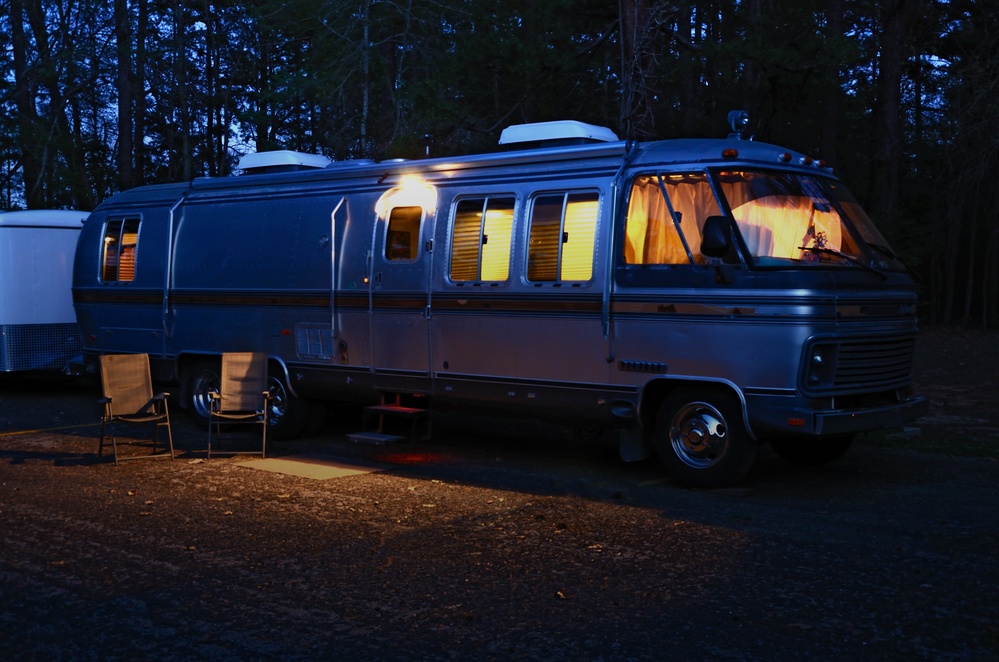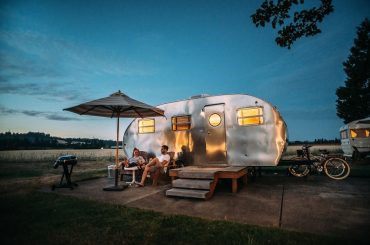I have lived in every class of motorhome, a camper and now even an Airstream trailer (and even my car at one point, 4 years ago). When it comes to living by yourself long term in an RV, well I have a lot of experience with this subject. I have lived as a digital nomad, with internet access, a laptop and power so I could build myself up in life while living cheaply in a vehicle to save costs.
The other day as I was doing keyword research for new RV related articles I was looking through the list of keywords people enter into Google search that are related to “RV Living”. And in that related search phrases list I kept seeing pretty bleak things like “suicide hotline“, “depression advice“, “is living in an RV considered homeless” and “I need a reason to live“.
Sheesh! I mean, I DO get it; living alone in an RV can be very lonely, especially if you’re broke and had to downsize from how you may have lived larger, but come on….I like to think of living out of a vehicle as an adventure and even in the darkest of times, it has been. Living in an RV is kind of like living in a land boat, and you’re able to sail away to other places, free to go where you want and set your own hours. There’s so many ways to make some cash to sustain yourself if you have even some skills. My biggest problem has usually been that I have expenses related to my startup Zenither which has a huge draining effect on my bank accounts. There is at least a good thousand out the door every month of my personal money just to keep this startup going while we fundraise the next round.
Luckily for these lonely RVers though, I am going to throw up some articles aimed at people living in RVs who are depressed and lonely to give them advice on how to re-frame their thinking when they start to feel hopeless, along with my articles about how to make money while living out of an RV.
Here is some advice for those of you suffering Road Life Blues.
How to Overcome Negative Emotions Living in a Motor Vehicle
People of all ages are giving up the everyday hustle and bustle to live on the road. There’s nothing like living by your own rules, waking up in a new place everyday, and meeting new people, right?
Unfortunately, this isn’t the case for everyone living in an RV or vehicle, especially in the beginning. In fact, many people living on the road experience stress, anxiety, loneliness, and depression. This is especially true for people living in a car or motorhome due to lack of other options they would prefer, such as living in an apartment or a house. When it comes to negative emotions surrounding the lifestyle of living on the road, understanding the cause makes it easier to overcome these feelings and enjoy your newly found freedom.
Common Causes of Negative Motorhome-Related Feelings
Oftentimes, people watch people living in a car or an RV on social media and believe it’s as luxurious as the influencers make it look. However, the problem with this notion is many people don’t see the struggles these people face when the camera goes off. There’s more to road life than taking selfies and sightseeing, especially if you’re used to traditional living.
One of the greatest misconceptions deals with the transitioning period of starting life as a full-time RVer. Most people think “Hey, I’m finally able quit my job and take my life into my own hands“. They believe the world is their oyster and giving up all of their belongings is the key to happiness. Yet once the reality of road life hits, it makes some people living on the road depressed, especially if they don’t have specific goals or direction in what they wish to achieve. People traveling alone are even more susceptible to these negative emotions.
Fear of Missing Out
Typically, people experience sadness living in a car or RV because they’re no longer surrounded by loved ones and things they’re used to doing. Basically, they have FOMO, which stands for fear of missing out. What will I do without my favorite pastimes? Will my family and friends miss me? These thoughts become a tornado of negative thoughts that can be overwhelming, especially in the beginning.
If you’re experiencing FOMO, it’s possible to overcome these thoughts. For instance, if you’re down about missing quality time with your family, regularly schedule audio and video calls. If you constantly travel and your loved ones live on or near your path, you can also visit them during your route.
If you’re looking to meet new people on the road, social media apps offer group events for people living in motorhomes. They understand loneliness and depression associated with the road life, so they can give quality support and advice.
Boredom
People usually figure once they quit their jobs they’ll have all the time in the world to follow their dreams and do the things a schedule prevented them from accomplishing. This is true, but only for people who have goals and a plan. Otherwise, it’s similar to having a day off and just lounging around all day.
Before deciding to live on the road, map out what you’ll do with your free time. If you have hobbies, designate time throughout the day to practice them. If you want to take on a new skill, bringing resources on the road with you gives you healthy ways to spend your time. Remember, boredom primarily centers around lack of interest, so make sure you put time into finding your passion before you make the big switch.
Living in the Moment
When you watch movies of people on road trips, the actors always have a great time. Somehow, they always end up in the right place at the right time. They even end up falling in love.
Whenever you’re comparing your journey to fictional movies or social media posts, you’ll always have trouble embracing your own journey. Comparison is the easiest way to sabotage your happiness. Comparing yourself to others is especially dangerous since you don’t see where they were before they began finding success. The best way to combat comparing yourself to others is embracing your own journey.
Even if things start off a bit rocky, it’s best to live in the moment. Ups and downs are a part of any journey. Being present during the good and bad times is the best way to overcome and enjoy life on the road. Journaling, meditation, and other self-reflective exercises are great ways to keep everything in perspective.
Seek Professional Help if You Need It
In some cases, living in an RV or motorhome doesn’t get better with time, hobbies, or a positive attitude. A death in the family or other traumatizing events while on the road can lead to a negative mental state that takes professional intervention. Luckily, you can get help with a remote therapist.
Finding an online therapy firm allows you to find a therapist and schedule video, audio, and even text chats. Best of all, these remote sessions are affordable. They’ll give you exercises and activities to improve your thought process in a constructive way. One of the best features associated with remote therapists is some sites offer an around-the-clock texting service. These are great for venting, whether it’s nine o’clock at night or three in the morning.
Even if your therapist doesn’t see your message until operating hours, you have an outlet to release intense emotions in the moment. Once they see your message, they’ll respond accordingly. This is also a great alternative to worrying your loved ones in the middle of the night.
Conflict Resolution While RV Living
If you’re traveling in a small space with your partner or small kids, things can get a bit tense. A disagreement every once in a while is normal, especially being stuck together for extended periods of time. Therefore, conflict resolution is especially important.
Conflict in a home can be difficult, but you have the option of going to different rooms to cool off. In a small space where you’re forced to make eye contact, communication is the key to a healthy living environment.
It’s also recommended to spend time alone. Don’t feel guilty about taking a few minutes to breathe. This actually eases tension between you and your family before it escalates.
Embrace a Lack of Convenience
If you’re used to soaking in a steaming bubble bath or watching TV every night, chances are you’ll have to give up these luxuries for road life. Of course, a transitional period of missing your old, comfortable life is normal. However, over time it’s important to embrace your new life. After all, you decided to leave your old lifestyle. Remember your past but appreciate being in the present.
Like any transitional period, RV living comes with a few hiccups. It’ll be hard in the beginning, especially without the majority of your belongings. By planning ahead, focusing on your hobbies and goals, and making time for your mental health, you’ll grow to enjoy the road life.
Keep in mind, being on the road doesn’t mean you’re alone. Even if you cannot be with your family, there are resources to help meet people enjoying the road life. You can also schedule regular calls and video chats with loved ones when you’re feeling homesick.
If you need professional help, consider a remote therapist. Do whatever it takes to feel at home, even if the location of your home changes. Before you know it, you’ll be helping other people adjust to life on the open road.
If you came to this article from one of those Google searches I mentioned before, I hope this article helps you. Hang in there.




